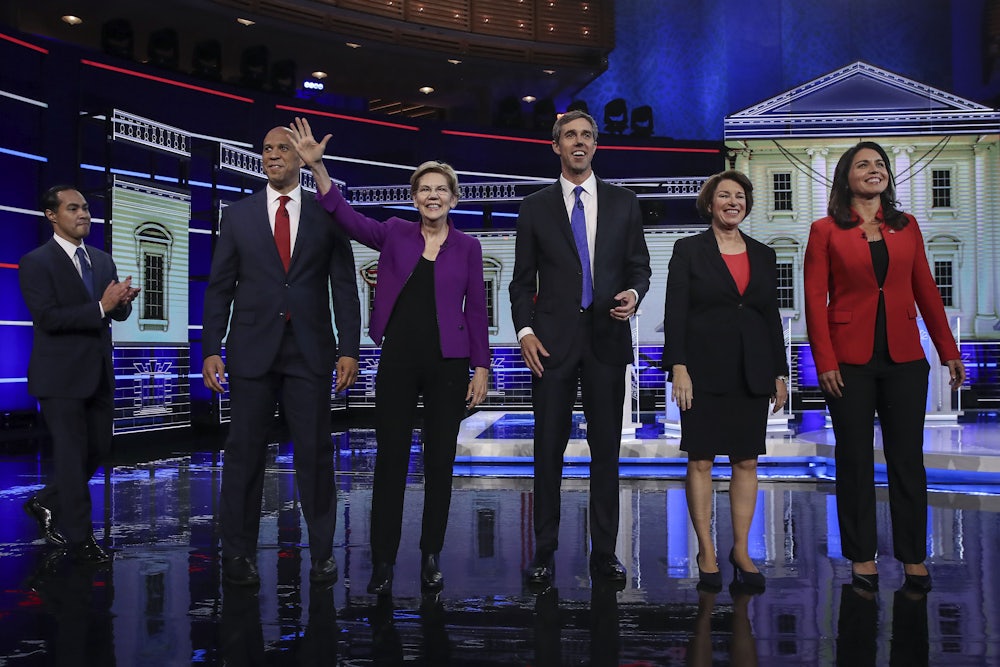It may be remembered as the Wretched Excess Debate with ten candidates, five moderators, one ludicrous White House backdrop, and enough technical glitches to make you nostalgic for the TV test pattern era.
Television pundits will undoubtably overhype the significance of the interlocking question-and-answer session that was mislabeled as a debate on Wednesday night. But, in truth, many of the momentary controversies (Julian Castro versus Beto O’Rourke on immigration, and an angry Bill de Blasio seemingly against the world) will prove evanescent, lost in the ebb-and-flow of a long campaign.
We may be too obsessed with gotcha questions and viral moments to understand the contours of this opening-gun event. Seven months before the Iowa caucuses, all the candidates (with the exception of Joe Biden and Bernie Sanders, who will appear in Miami Thursday night, for the second of the two debates) are, in effect, introducing themselves to the voters. Even Elizabeth Warren, conspicuously placed center stage, used part of her closing statement to explain that she grew up in hard-scrabble circumstances dreaming of becoming a public school teacher.
Debates such as these provide chances for credible candidates to move up in the rankings by making the most of their opportunities. By my impressionistic reckoning, the most successful candidates Wednesday night were two senators who started the campaign with promise but have never—up until now—had their moment. A small cheer for Cory Booker and Amy Klobuchar.
Booker (who talked the longest, at nearly eleven minutes spread out over the two-hour debate) had a number of moments that came across powerfully on television. For example, the New Jersey senator—who represents a state where half the largest drug companies in the nation are headquartered—was asked pointedly whether he believes that the manufacturers of opioids should be subject to criminal sanctions for their actions.
Without hesitating, without playing home-state politics, Booker said, “They should absolutely be held criminally liable because they are liable and responsible.” (A quick fact-check reveals that Booker received $330,000 in contributions from pharmaceutical industry company PACs and their employees in his last campaign.)
Klobuchar managed the difficult trick of appearing both firm and likable.
Asked about her opposition to a Bernie Sanders–style Medicare for All program, Klobuchar defended the “public option” and added, “I am simply concerned about kicking half of America off their health insurance in four years, which is exactly what this bill does.”
Then the Minnesota senator pivoted to an attack on Donald Trump’s drug plan that, she said, amounted to “$100 billion in giveaways to the pharma companies.” That set up Klobuchar’s undoubtedly practiced line: “That’s what we call at home ‘all foam and no beer.’” Rhetorically, that soundbite was an Iron Range improvement on the hackneyed Texas expression, “All hat and no cattle.”
Warren was expected to be the pivot point around which the debate revolved—and she was during the first segments on the economy. In fact, the tag-team NBC moderators initially called upon Warren so often that it was beginning to seem like, in this debate, the politically rich got richer, which is not exactly her philosophy.
Warren’s answers were consistently strong and confident: “Giant corporations have exactly one loyalty, and that is to profits.” Her passion was evident in virtually every response, but the short-answer format (60 seconds was treated as the equivalent of a Senate filibuster) eliminated much of the Happy Warrior joy that she can radiate in backyard settings in Iowa.
Some of the after-action debate analysis suggested that Warren had made a significant error in explicitly endorsing for the first time the eventual elimination of private health insurance under the Medicare for All plan. As she put it during the debate, “I understand there are a lot of politicians who say, ‘Oh, it’s just not possible; we just can’t do it.’... What they’re really telling you is they just won’t fight for it. Well, health care is a basic human right, and I will fight for basic human rights.”
In truth, Warren’s entire campaign is predicated on staking out positions—such as a wealth tax—that are the antithesis of play-it-safe Democratic politics. Modulating her position on health care might prove to be politically advantageous if she turns out to be the nominee, but that kind of temporizing is not her style and would undermine her political persona.
O’Rourke, one of the three candidates on the debate stage to speak Spanish, had an uneven night. His best moment came when asked about his position on humanitarian intervention in places where America has no vital strategic interests. Rather than equivocating, he said directly, “The answer is yes, but that action should always be undertaken with allies and partners and friends. When the United States presents a united front, we have a much better chance of ... preventing the kind of genocide ... that we saw in Rwanda.”
But at other times, O’Rourke’s garrulous “I met a young man who ...” style of recounting a political anecdote failed to work within the rigid time constraints. And, on my television at least, O’Rourke looked like he had hired Richard Nixon’s make-up man from his 1960 debate with John Kennedy.
Post-debate analysis is a risky calling—and perhaps the real story of Wednesday night may turn out to be that Julian Castro or Jay Inslee was the candidate who achieved liftoff. There are no certainties in this game, only hunches. And, thus, I will go with my initial impression that Booker and Klobuchar were the candidates who got a much-needed boost.
